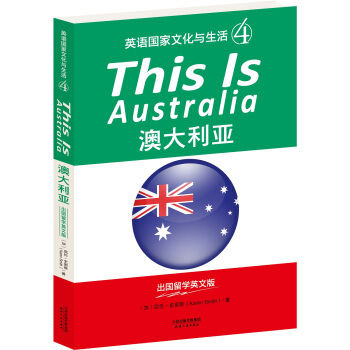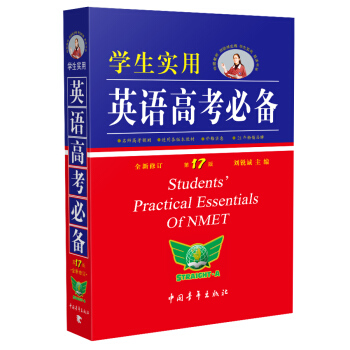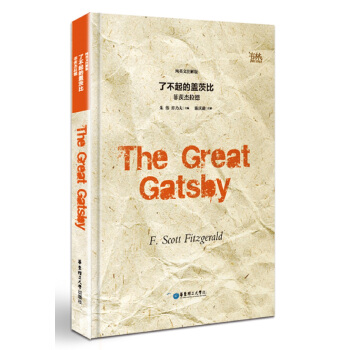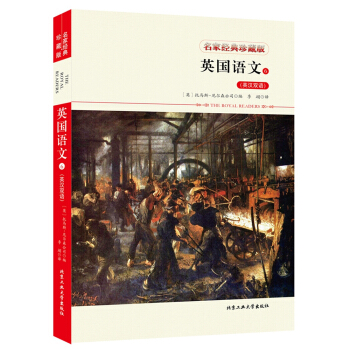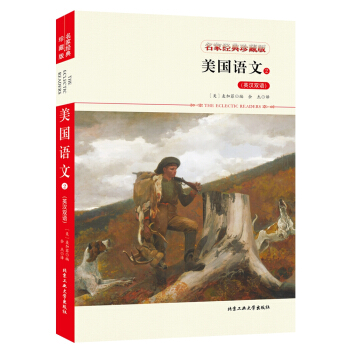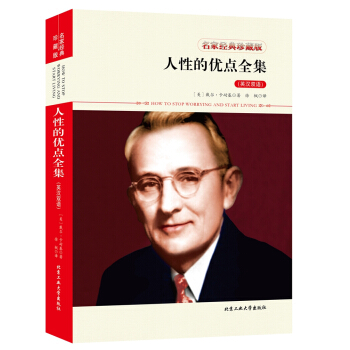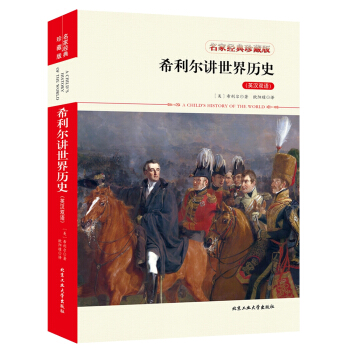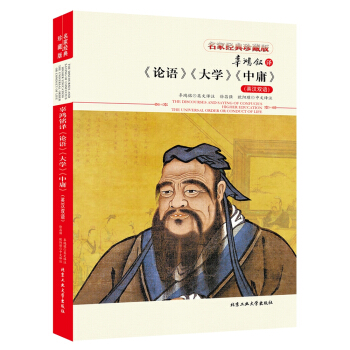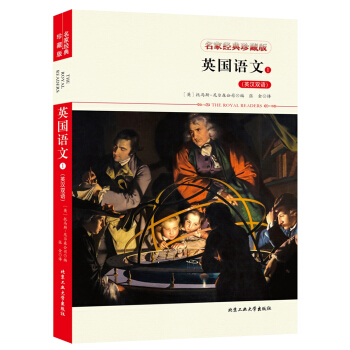![鲁滨孙漂流记(英文版) [Robinson Crusoe]](https://pic.windowsfront.com/12126613/59643ba3Nc1c16ac4.jpg)

具体描述
内容简介
《鲁滨孙漂流记》以真实具体、亲切自然的文风描写鲁滨孙孤独地在海上生活二十八年的经历,不仅在英国文学史上是个里程碑,而且在世界文学史上都可称作第一部以现实主义文风写出的现代小说,由此,作者笛福就有了“现代小说之父”的美称。笛福一生笔耕不辍,作品包括新闻报道、政治宣传册等共有250种(另一说有500种)之巨。大量的写作磨练了笛福的笔锋,《鲁滨孙漂流记》不论是叙事,还是写景,大都能够使人如闻其声、如临其境,因而,阅读这部书的人在各国的小说读者群中一直高居榜首。此书自出版至今已被译成各种文字,在全球行销不啻几百版。
作者简介
笛福(Daniel Defoe,1660?-1731),英国小说家。笛福只受过中等教育,宗教上受其父的影响,一直保持不同于国教信仰的立场,政治上倾向于辉格党。笛福早年经营内衣、烟酒、羊毛等生意,到大陆各国贸易,又曾参加反对国教的叛乱,提倡筑路,办银行、保险业、女学、疯人院,并曾因反对贵族天主教势力而被捕入狱。
笛福于59岁开始写作小说,因《鲁滨孙漂流记》一炮而红,此后写作了《鲁滨孙沉思集》、《辛格尔顿船长》、《杰克上校》、《罗克萨娜》等小说,还有若干传记。
目录
Chapter I Start in Life . . . . . . . . . . . . . . . . . . . . . . . . . . . . . 001Chapter II Slavery and Escape . . . . . . . . . . . . . . . . . . . . . . 010
Chapter III Wrecked on a Desert Island . . . . . . . . . . . . 018
Chapter IV First Weeks on the Island . . . . . . . . . . . . . . . 031
Chapter V Builds a House-The Journal . . . . . . . . . . . . . . 046
Chapter VI Ill and Conscience-Stricken . . . . . . . . . . . . . 055
Chapter VII Agricultural Experience . . . . . . . . . . . . . . . . 065
Chapter VIII Surveys His Position . . . . . . . . . . .. . . . . . . 072
Chapter IX A Boat . . . . . . . . . . . . . . . . . . . . . . . . . . . . . . . . 079
Chapter X Tames Goats . . . . . . . . . . . . . . . . . . . . . . .. . . . . 090
Chapter XI Finds Print of Man’s Foot on the Sand . . . . 099
Chapter XII A Cave Retreat . . . . . . . . . . . . . . . . .. . . . . . . 108
Chapter XIII Wreck of a Spanish Ship . . . . . . . . . . . . . . . 120
Chapter XIV A Dream Realised . . . . . . . . . . . . . .. . . . . . . 129
Chapter XV Friday’s Education . . . . . . . . . . . . . . .. . . . . . 140
Chapter XVI Rescue of Prisoners from Cannibals . . . . 151
Chapter XVII Visit of Mutineers . . . . . . . . . . . . .. . . . . . . 162
Chapter XVIII The Ship Recovered . . . . . . . . . . . . . . . . . 173
Chapter XIX Return to England . . . . . . . . . . . . . . . . . . . . 185
Chapter XX Fight Between Friday and a Bear . . . . . . . . 195
精彩书摘
Chapter I Start in LifeI was born in the year 1632, in the city of York, of a good family, though not of that country, my father being a foreigner of Bremen, who settled first at Hull. He got a good estate by merchandise, and leaving off his trade, lived afterwards at York, from whence he had married my mother, whose relations were named Robinson, a very good family in that country, and from whom I was called Robinson Kreutznaer; but, by the usual corruption of words in England, we are now called—nay we call ourselves and write our name—Crusoe; and so my companions always called me.
I had two elder brothers, one of whom was lieutenant-colonel to an English regiment of foot in Flanders, formerly commanded by the famous Colonel Lockhart, and was killed at the battle near Dunkirk against the Spaniards. What became of my second brother I never knew, any more than my father or mother knew what became of me.
Being the third son of the family and not bred to any trade, my head began to be filled very early with rambling thoughts. My father, who was very ancient, had given me a competent share of learning, as far as house-education and a country free school generally go, and designed me for the law; but I would be satisfied with nothing but going to sea; and my inclination to this led me so strongly against the will, nay, the commands of my father, and against all the entreaties and persuasions of my mother and other friends, that there seemed to be something fatal in that propensity of nature, tending directly to the life of misery which was to befall me.
My father, a wise and grave man, gave me serious and excellent counsel against what he foresaw was my design. He called me one morning into his chamber, where he was confined by the gout, and expostulated very warmly with me upon this subject. He asked me what reasons, more than a mere wandering inclination, I had for leaving father’s house and my native country, where I might be well introduced, and had a prospect of raising my fortune by application and industry, with a life of ease and pleasure. He told me it was men of desperate fortunes on one hand, or of aspiring, superior fortunes on the other, who went abroad upon adventures, to rise by enterprise, and make themselves famous in undertakings of a nature out of the common road; that these things were all either too far above me or too far below me; that mine was the middle state, or what might be called the upper station of low life, which he had found, by long experience, was the best state in the world, the most suited to human happiness, not exposed to the miseries and hardships, the labour and sufferings of the mechanic part of mankind, and not embarrassed with the pride, luxury, ambition, and envy of the upper part of mankind. He told me I might judge of the happiness of this state by this one thing—viz. that this was the state of life which all other people envied; that kings have frequently lamented the miserable consequence of being born to great things, and wished they had been placed in the middle of the two extremes, between the mean and the great; that the wise man gave his testimony to this, as the standard of felicity, when he prayed to have neither poverty nor riches.
He bade me observe it, and I should always find that the calamities of life were shared among the upper and lower part of mankind, but that the middle station had the fewest disasters, and was not exposed to so many vicissitudes as the higher or lower part of mankind; nay, they were not subjected to so many distempers and uneasinesses, either of body or mind, as those were who, by vicious living, luxury, and extravagances on the one hand, or by hard labour, want of necessaries, and mean or insufficient diet on the other hand, bring distemper upon themselves by the natural consequences of their way of living; that the middle station of life was calculated for all kind of virtue and all kind of enjoyments; that peace and plenty were the handmaids of a middle fortune; that temperance, moderation, quietness, health, society, all agreeable diversions, and all desirable pleasures, were the blessings attending the middle station of life; that this way men went silently and smoothly through the world, and comfortably out of it, not embarrassed with the labours of the hands or of the head, not sold to a life of slavery for daily bread, nor harassed with perplexed circumstances, which rob the soul of peace and the body of rest, nor enraged with the passion of envy, or the secret burning lust of ambition for great things; but, in easy circumstances, sliding gently through the world, and sensibly tasting the sweets of living, without the bitter; feeling that they are happy, and learning by every day’s experience to know it more sensibly.
After this he pressed me earnestly, and in the most affectionate manner, not to play the young man, nor to precipitate myself into miseries which nature, and the station of life I was born in, seemed to have provided against; that I was under no necessity of seeking my bread; that he would do well for me, and endeavour to enter me fairly into the station of life which he had just been recommending to me; and that if I was not very easy and happy in the world, it must be my mere fate or fault that must hinder it; and that he should have nothing to answer for, having thus discharged his duty in warning me against measures which he knew would be to my hurt; in a word, that as he would do very kind things for me if I would stay and settle at home as he directed, so he would not have so much hand in my misfortunes as to give me any encouragement to go away; and to close all, he told me I had my elder brother for an example, to whom he had used the same earnest persuasions to keep him from going into the Low Country wars, but could not prevail, his young desires prompting him to run into the army, where he was killed; and though he said he would not cease to pray for me, yet he would venture to say to me, that if I did take this foolish step, God would not bless me, and I should have leisure hereafter to reflect upon having neglected his counsel when there might be none to assist in my recovery.
……
用户评价
抛开那些关于冒险和求生的表面叙事,这部小说实则是一场关于“身份重塑”的深刻探讨。主人公在完全脱离了社会既有的评判体系、阶级结构和既定身份后,他的本质是什么?他如何定义自己?作品巧妙地利用了与世隔绝的环境,迫使角色进行一场彻底的自我审视。他不再是社会赋予的某个头衔,而是一个赤裸裸的个体,他的价值完全由他的行动和产出决定。这种极端环境下的“去社会化”,引发了关于自由与责任的复杂思考。当所有的外部约束都被移除后,内在的道德罗盘如何运作?他与新出现的“伙伴”之间的关系,也充满了对权力、依赖和主导权的微妙张力。这种对人与人之间基本关系的重新构建和测试,比单纯的植物学观察或建筑学实践更引人入胜,因为它触及了人类社会存在的底层逻辑,是关于“人之所以为人”的最纯粹的辩论。
评分这部作品的结构精妙之处在于,它成功地将宏大的“生存主题”与微小的“日常琐事”完美地编织在一起。读者可以清晰地看到,一个受过文明社会熏陶的人,是如何一步步地将自己重塑为一个纯粹的“生存机器”,又是如何艰难地保留下文明的火种的。那些关于如何制作陶器、如何驯服山羊、如何计算季节的段落,读起来毫不枯燥,反而充满了科学探究的乐趣。这不仅仅是简单的生存指南,更是对人类实践智慧的赞歌。作者没有回避过程中的失败和挫折,正是这些失败,才使得最终的成功显得如此来之不易,如此真实可信。通过对这些实用技能的详细描述,作品间接探讨了知识和技能在极端环境下作为最高财富的价值。它提醒我们,我们所依赖的现代社会体系是多么脆弱,而真正赋予我们力量的,是我们大脑中那些能够解决实际问题的能力。那种从零开始,依靠双手和头脑搭建起一个独立王国的成就感,几乎是跃然纸上,极具感染力。
评分这部作品的文字构建简直是一场感官的盛宴,作者的笔触细腻入微,仿佛能透过纸面感受到那种原始的、与自然搏斗的粗粝质感。每一次对环境的描摹,都不是简单的罗列,而是融入了人物内心深处的挣扎与感悟。比如,当他描述那片荒芜的沙滩时,那种被世界遗弃的孤独感,通过对阳光角度、海风咸湿度的精确捕捉,化为一种令人窒息的压抑,读者能切实体会到那种与世隔绝的漫长岁月的重量。我尤其欣赏他对时间流逝的刻画,它不是线性的、枯燥的记录,而是被情绪和生存的迫切性所扭曲和拉伸。有些日子仿佛过了一辈子那么漫长,而另一些充满重大发现的日子,却在回忆中一闪而过。这种对主观时间体验的精准拿捏,让这部小说不仅仅是一个冒险故事,更像是一部探讨人类心智如何适应极端环境的心理学侧写。文字的节奏感也把握得极佳,平静时的舒缓与突发危险时的急促,形成鲜明的对比,让阅读过程充满了张力,让人在捧读时,不知不觉中屏住了呼吸,完全沉浸在那份独自面对浩瀚宇宙的渺小与坚韧之中。
评分这本书的叙事视角,是一种极其引人入胜的“内省式记录”。它更像是一份详尽的个人日志,记录者不仅在与外部世界——那些无法预测的潮汐、凶猛的野兽、匮乏的资源——进行殊死搏斗,更是在与自己的思想、恐惧和希望进行一场永无休止的辩论。这种坦诚暴露了人性深处的脆弱,但同时也彰显了人类精神中那股不可磨灭的韧劲。我被那种近乎偏执的条理性和计划性深深吸引,面对绝境,主人公没有选择彻底的绝望,而是诉诸于逻辑、重复的劳动和对细节的关注来构建一个可控的“微观世界”。这种重建秩序的行为,远比单纯的捕猎或建造庇护所来得更有力量,它揭示了人类如何通过“做”来对抗“虚无”。每一次工具的改进,每一次收获的积累,都不仅仅是物质上的富足,更是精神上对“我依然存在,我依然能够掌控”的坚定宣告。作者对于这种心理修复过程的描绘,深刻而富有启发性,让人反思自身在日常困境中是如何构建和维护自己的心理防线的。
评分阅读体验的独特性在于,它提供了一种近乎冥想式的沉浸感,让你仿佛成为了那片孤岛上的第二位居民。作者对于自然界运行规律的观察之细致,已经超出了一个普通人的范畴,带有一种近乎虔诚的敬畏。他笔下的自然不是一个静止的背景,而是一个充满生命力、充满潜在威胁和慷慨馈赠的复杂系统。每一次日出日落,每一次风暴过境,都被赋予了强烈的象征意义,它们既是时间的标记,也是角色内心状态的投射。这种与自然界进行高强度、高风险的“对话”,让读者在跟随主人公的脚步时,也重新审视了自己与我们赖以生存的星球之间的关系。它并非是歌颂征服,而更像是倡导一种“共存”的智慧——只有真正理解并尊重自然的规则,才能在其中获得一席之地。这种对宏大自然力量的细致描摹和深刻理解,使得整部作品超越了单纯的探险文学,上升到了一种关于人类在宇宙中位置的哲学沉思。
评分包装可以,书感觉很合适
评分宝贝很好,第一次网上买书,很满意,下次还来
评分宝贝很好,第一次网上买书,很满意,下次还来
评分宝贝很好,第一次网上买书,很满意,下次还来
评分买了一套,对学习英文很有帮助。质量很好,值得信赖。
评分包装可以,书感觉很合适
评分宝贝很好,第一次网上买书,很满意,下次还来
评分买了一套,对学习英文很有帮助。质量很好,值得信赖。
评分包装可以,书感觉很合适
相关图书
本站所有内容均为互联网搜索引擎提供的公开搜索信息,本站不存储任何数据与内容,任何内容与数据均与本站无关,如有需要请联系相关搜索引擎包括但不限于百度,google,bing,sogou 等
© 2026 book.coffeedeals.club All Rights Reserved. 静流书站 版权所有

